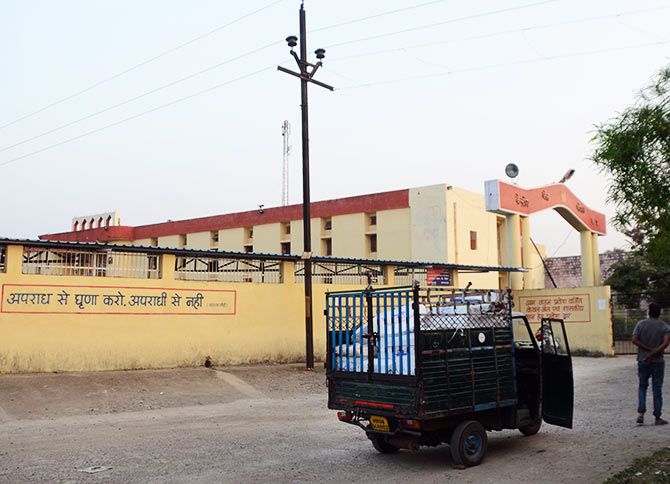- What really happened on October 30-31 in Bhopal?
- 'The prisoners were wearing layers and layers of clothes'
- 'I smell a fake encounter'
'When integrity is compromised for whatever gratification is when prisoners breach the system and get away.'
ADGP, Jails, Sushovan Banerjee, who was shunted out after eight prisoners killed a head constable and escaped, speaks out.
Rediff.com's Prasanna D Zore reports from Bhopal.

History, it seems, has an uncanny habit of repeating itself.
And with added ferocity, if one can say so in hindsight.
Had government officials and the authorities in charge of jail security in Madhya Pradesh taken cognizance of three letters (yes, you read that right), written over five days -- October 3, 4 and 7 -- by then additional director general of police, jails, Sushovan Banerjee, the jailbreak by eight prisoners, allegedly members of the outlawed Students Islamic Movement of India, on the night of October 30-31 could have been averted.
And the precious life of head constable Ramashankar Yadav, who was allegedly killed by these eight men inside the Bhopal Central Jail, could have been saved.
Banerjee, who was transferred by the Shivraj Singh Chouhan government the day after the jailbreak, in his three letters to concerned government officials and others, clearly mentioned the danger of keeping 29 SIMI activists inside the same prison.
Without delving into speculation about how a jailbreak could occur inside a prison that is considered one of the most secure in India, Banerjee says, "When integrity is compromised for whatever gratification is when such people (the prisoners) are able to breach the system and get away."
"In this case I have a very strong suspicion that integrity was compromised which led to such a horrifying incident (the jailbreak and murder of head constable Ramashankar Yadav). There must be some reason why it happened on the day it happened and not in the last three years," he adds.
Three years ago, on October 1, 2013, six SIMI activists escaped from another high-security prison in Madhya Pradesh, the Tantya Bheel Jail in Khandwa district.
Soon after, the then inspector general of police, jails, G K Agarwal, wrote a similar letter to then MP chief secretary Anthony Desa, about the lapses that helped the SIMI prisoners escape from the Khandwa jail.
Despite such alerts being sounded by senior jail officials, the Shivraj Singh Chohan government in Madhya Pradesh was caught napping on October 30-31.
"I gave specific alerts," says Banerjee about the recent jailbreak, highlighting the fact that he had mentioned the presence of 29 SIMI activists in one jail in his letter to Bhopal Jail Superintendent Akhilesh Tomar.
Tomar could not be contacted when this correspondent visited the Bhopal Central Jail on the afternoon of November 3. A guard posted outside his home, located 100 metres away from the jail, said, he was not home.
"Pehle agar dekh lete toh yeh nahi hota (If they had taken cognisance of such security lapses, then this jailbreak could have been averted)," a senior officer at the state police headquarters in Bhopal, said, speaking on the condition he would not be named in this report.
"You should have triggered a change after the Khandwa jail break that happened in (October) 2013, but I really don't expect much to change because then elections will come and most (jail) infrastructure funds will be diverted to win votes and not for creating jail infrastructure because that will not get votes," the police officer added.
"This unfortunate incident could have been avoided had everybody done their jobs in the manner they were expected to do," the officer pointed out.
"It is the job of senior officers to create a system and ensure that the system is followed. The executive who are responsible for a particular job just needed to follow the practices that have been already laid down, that have been communicated and also take specific measures during times of crisis when specific alerts were issued," the officer said, highlighting the gaps that allowed guards meant for jail duty to be diverted elsewhere.
As for Banerjee, he says, he has been made a scapegoat.
"Who, why and such other questions will emerge only after an internal inquiry is completed, but I can tell you that at my level everything that was needed to be done was done."
"I was responsible for 123 jails and 40,000 inmates and I can't be in every place at the same time, supervising what each and every person is doing," he says.
"Why was the DG, Jails, not pulled up?" he asks.











 © 2025
© 2025